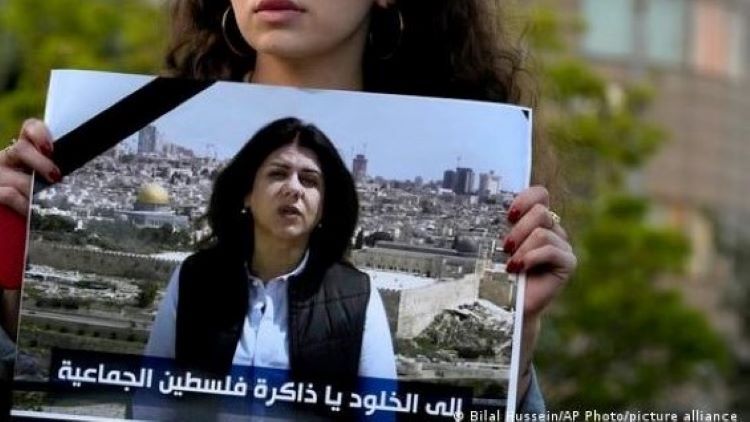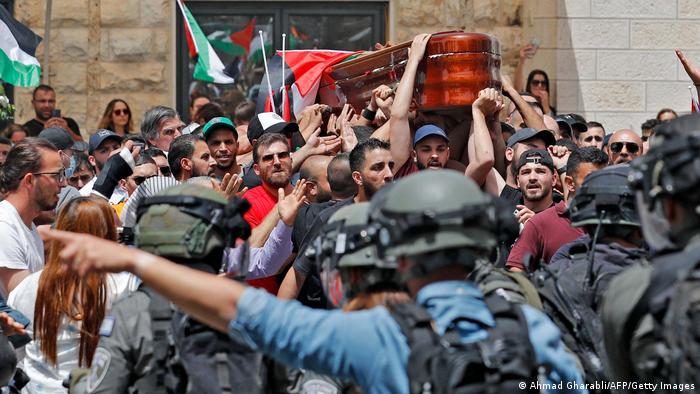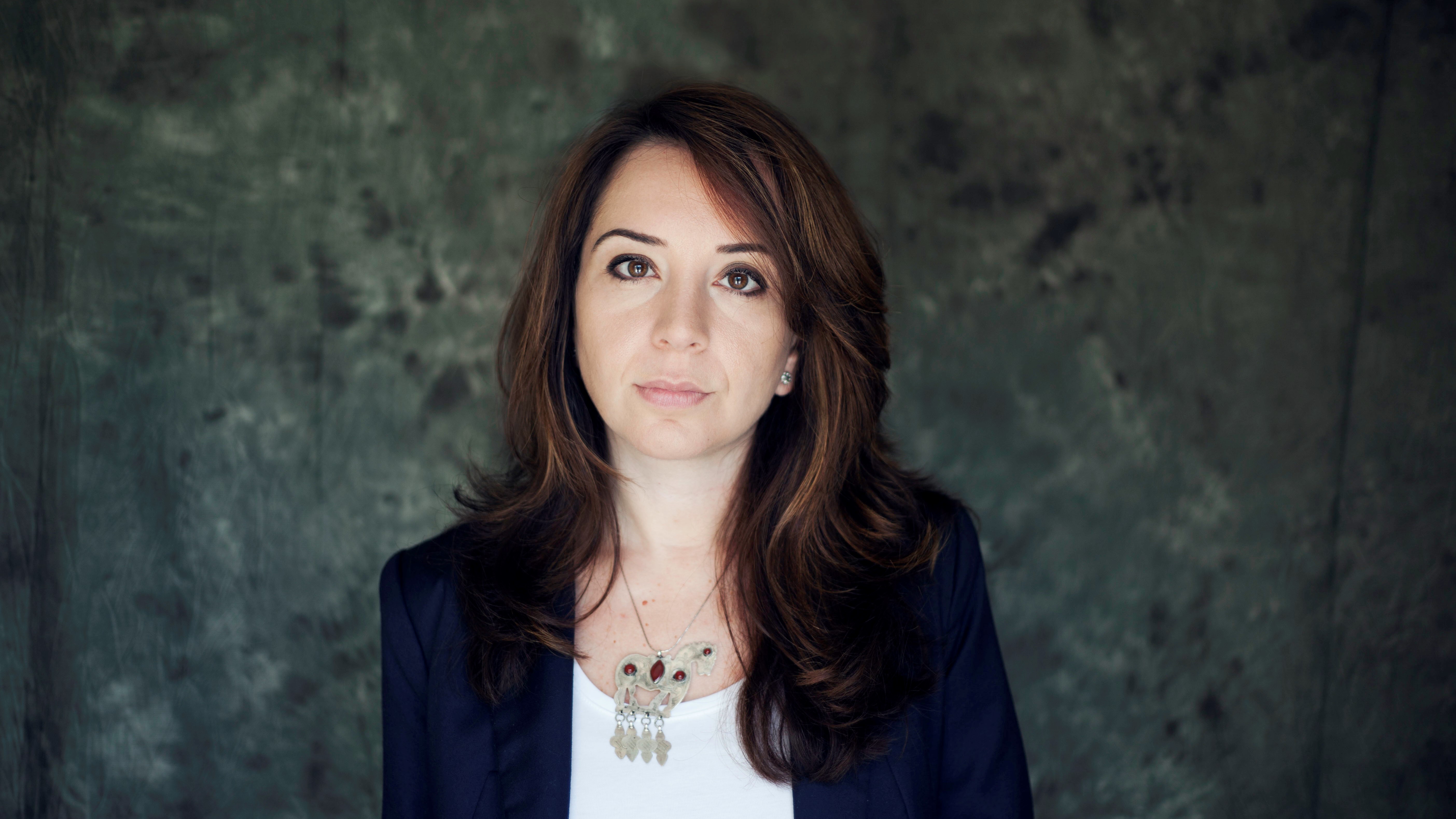The face of a generation

A lot of people have paid tribute to Shireen Abu Akleh. After all that has been said, how would you describe her?
Dalia Hatuqa: Let’s start with the basics: Shireen was a Palestinian Christian from East Jerusalem. She studied architecture in Jordan, then Media Studies. In 1997 she joined Al-Jazeera. She became one of their first female reporters and when the Second Intifada started, she became a war reporter. She gained a lot of experience working in the field for almost three decades: she was a familiar face to many. A whole generation of Palestinians grew up seeing her on TV. She was one of the best-known reporters covering the conflict. Now she leaves a huge gap. There isn’t anybody like her. Many colleagues at Al-Jazeera are very good journalists, but she was just different.
In what way?
Hatuqa: She possessed a unique calm, and a special personality; even when she got scared, she never ran away, she would always stick in one place. Just watching her in the middle of dangerous situations – how calm and collected she would remain – was such an inspiration. It’s normal to be afraid in the midst of so much violence, so it is hugely inspiring to encounter someone who dealt with the situation differently.
Were you part of this generation that grew up with her?
Hatuqa: I was already in my twenties when I started watching her on TV. She was the face of the difficult period of the Second Intifada, the curfews, and the Israeli incursion of 2002. At the time, I didn't think of her as a role model; my own career in journalism started almost accidentally. But over the years I received support from a lot of women and men – and Shireen was one of them. We would always discuss stories. She was a peer, and so much more than that. Since she was the more experienced journalist, I would often ask her advice.

What do you remember most about her personality?
Hatuqa: She was very down-to-earth, not a media diva, even though she had a very senior position. People would stop her in the street, and she would always happily have her picture taken with them. As a person in front of the camera she was one thing, but behind the camera she was an extremely funny person. She loved to party, she loved to joke, and she loved to travel. All the hardships she had seen and encountered personally – her parents died when she was still quite young – or professionally, did not break her spirit.
Covering all the violence, all the human rights abuses, all the individual tragedies never broke her. The way she dealt with people was special. When she was seconded to Al-Jazeera’s Washington bureau for a few months, I was based in DC at the time. Even there people would recognise her and take selfies. I can still hear her saying: "Dalia, take me shopping!" She was always joking; she liked to go out.
After two weeks: what do we know about the killing of Shireen?
Hatuqa: When she was killed on 11 May 2022 she was on assignment in Jenin and wearing a blue "press" vest and a helmet. In one of the videos that was filmed in close proximity, you can hear somebody saying "Look, there is a sniper over there!" Then Ali Al-Samudi, the Al-Jazeera producer who was with Shireen attempts to leave his position and is shot in the back, and you hear Shireen saying "Ali is injured". Other colleagues have also described sniper fire being directed at the journalists and everyone who came near Shireen after she was shot.
This is in contrast to the Israeli authorities and Prime Minister Bennett, who have suggested that Palestinian fighters were likely responsible for her death, posting the video of a Palestinian man shooting down an alleyway. But pretty soon, researchers from B’Tselem and others established the spot where the clip was filmed – almost 300m away. There is now a considerable amount of evidence indicating that the Israeli army was responsible for the killing. The Israeli authorities have changed their narrative several times, including regarding the possibility of an investigation. First, they announced one, then they said they couldn't go ahead as the Palestinian Authority was refusing to hand over the evidence. Does it really make sense to hand over evidence to the party allegedly responsible for the killing? – especially as investigations by the Israeli army rarely yield tangible results.
CNN report suggests Al Jazeera journalist killed by deliberate Israeli gunfire https://t.co/stzuOobo8V
— Haaretz.com (@haaretzcom) May 24, 2022
After the killing we also saw disturbing scenes at her funeral. Israeli police officers brutally attacked some of the pallbearers and confiscated Palestinian flags.
Hatuqa: Once again, there was an official Israeli narrative: that some people had started carrying the coffin and this was not what the family wanted. But her brother contradicted this account. According to him, there was no agreement with the Israeli police and it was okay for people to carry her casket. This is about something else. Israel does not accept any Palestinian presence in Jerusalem and apparently this even applies to the dead. They would not give Shireen peace in life, nor would they in her death. They were so upset by the sight of Palestinian flags that they started beating the mourners. One of the people who tried to hold the casket aloft while he was being beaten was detained and is still in detention. We don’t know where he is.
A lot of people voiced their dismay. Could this be a turning point?
Hatuqa: Maybe this was a shock for some – but not for me. The Israeli army does not show respect for Palestinians, whether dead or alive. In the past, Israel has confiscated a lot of Palestinian bodies and refused to allow their families the dignity of even burying their loved ones. The recent story of the killing of 78-year-old Omar Assad is one example. He died after he was arrested by the Israeli army. They blindfolded him, bound him, transported him to a cold construction side and left him to die. When he was found he had abrasions on his wrist; his family never got justice for his death. The Israeli army, again, has said they will investigate it. At best, they take minor disciplinary measures. But nothing really happens. Why should we expect things to be different this time?
There have been numerous calls for a thorough investigation. German Foreign minister Annalena Baerbock said, "It is important that her death is transparently investigated." Does this mean the chances are better this time?
Hatuqa: I don’t think that will make any difference. It won't even make a difference that she was an American citizen. The American government is as spineless as the Europeans when it comes to it. As I said, too many people have died before, and there was no investigation. This was also not the first high-profile killing. I have no faith that anything is going to change this time. Unfortunately, people have already moved on. The media, the news cycle has moved on. I don’t expect anything.

Meanwhile, just a couple of days after the killing, Germany banned demonstrations remembering the flight and expulsion of Palestinians in 1948 on "Nakba day". Is there a lack of empathy for Palestinian suffering?
Hatuqa: It is obvious that Germany has a problem here. When people took to the streets to protest peacefully despite the ban, they were not even allowed to say the words "Free Palestine". Any such statements are immediately branded as anti-Semitic. Honestly, this does not make any sense. When people call for freedom and justice in one place, does that mean we want to take justice and freedom away from another people? No! This is about delivering justice to Palestinians – because they deserve some kind of justice.
I am very well aware of Germany’s history. But there should be an obligation to commit to human rights and dignity everywhere. This must include Palestinians. German politicians still say they believe in a "two-state solution", but they do nothing to stop the injustice. Ultimately it’s all just words – lip service – at most, condemnation. What incentive is there for the Israeli government to change course, start serious investigations – or even end the human rights violations and the occupation? There is no pressure to do so. They receive military aid and co-operation from the United States and Europe. They enjoy excellent relations with everyone. There is no pressure whatsoever.
What should the German Foreign Minister do if she wants to encourage an independent investigation?
Hatuqa: Honestly, I have no idea what she should do; all I know is that it's not working this way. Without some kind of pressure, things will not change. People need to stop walking on eggshells and tell the Israeli government that this is a serious case requiring investigation. This would only work, however, if there was a group of Europeans keeping up the pressure.
What can the Palestinians do to pursue accountability?
Hatuqa: The Palestinian Authority urgently needs to involve an independent body to examine the evidence, the ballistics, the fragments of the bullets. And they need to act very quickly. They have already announced that they have submitted the case as a potential war crime to be added to the investigations of the prosecutor of the International Criminal Court (ICC). Civil society needs to raise its voice as well and press for accountability for Shireen’s death. Journalists must continue to address her story. They all have a role to play. Her killing was unjust – well, there are no just killings – but so outrageously unjust, we cannot let her story fade.
Interview conducted by Rene Wildangel
© Qantara.de 2022
